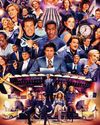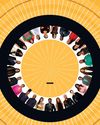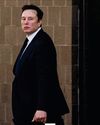
Addressing a sedate audience in suits and ties, the Vice President outlined plans to strengthen small businesses, cut taxes on the middle class, and build more affordable housing. "I am a capitalist," she told the Pittsburgh crowd, detailing how she would invest in startups and increase public-private partnerships, and describing an approach to economic growth that stressed stability.
It was a business-friendly speech tailored to business-friendly voters. But in a neck-andneck presidential race, wonky pitches like these could make the difference. In a September New York Times/Siena poll, nearly 30% of likely voters said they felt they needed to learn more about the Vice President before making their choice. The fight to define Kamala Harris-who she is, what she stands for, and what kind of President she would be-will be one of the central battles of the campaign's final weeks.
To examine these questions, TIME spoke with 20 current and former Harris campaign advisers, former aides in her vice presidential and Senate offices, senior officials from each of the past five presidential administrations, and a range of policy experts. The portrait that emerged was of a politician who is more practical than ideological-a cautious candidate running in a change election, juggling the liabilities and benefits of her ties to her boss, President Joe Biden, as well as her own past positions, all while trying to keep the focus on her opponent. For Harris, policy specifics are in service to the larger goal of her campaign, which is to present a credible alternative to a second Donald Trump presidency.
هذه القصة مأخوذة من طبعة October 28, 2024 من Time.
ابدأ النسخة التجريبية المجانية من Magzter GOLD لمدة 7 أيام للوصول إلى آلاف القصص المتميزة المنسقة وأكثر من 9,000 مجلة وصحيفة.
بالفعل مشترك ? تسجيل الدخول
هذه القصة مأخوذة من طبعة October 28, 2024 من Time.
ابدأ النسخة التجريبية المجانية من Magzter GOLD لمدة 7 أيام للوصول إلى آلاف القصص المتميزة المنسقة وأكثر من 9,000 مجلة وصحيفة.
بالفعل مشترك? تسجيل الدخول

CAVALCADE OF COMEDY
As Saturday Night Live celebrates its 50th season, alumni look back on the people, moments, and humor that shaped their time at an American institution

The Summer of Scam that never ended
EARLY IN THE NEW NETFLIX SERIES APPLE CIDER VINEgar, its star, Kaitlyn Dever, breaks the fourth wall.

The Italian 'Trump whisperer'
ITALIAN PRIME MINister Giorgia Meloni's political fortunes are far brighter than any other G-7 leader's.

The (real) problem with fake plants
WHEN THE GERMAN PHILOSOPHER IMMANUEL KANT puzzled over why nature looks beautiful to us, he considered the case of replicas.

Insecurity is the new inequality
DONALD TRUMP'S SECOND PRESIDENTIAL TERM HAS already been accompanied by a cascade of unnerving political and natural events-from the U.S.'s leaving the World Health Organization and the Paris Climate Accords, to the nighttime firings of inspectors general and pardons of the Jan. 6 rioters, to the raids targeting immigrants in a number of cities and the wildfires roaring through swaths of Los Angeles.

TIME the Closers
25 BLACK LEADERS WORKING TO END RACIAL INEQUALITY

THE PAW PATROL PRINCIPLE
How a toy company built a children's-television juggernaut

Mindy Kaling The writer, producer, and showrunner on the status of Legally Blonde 3, cooking with Meghan Markle, and her new Netflix comedy, Running Point
The family in Running Point has shades of Succession. Was that show on your mind?

A THOUSAND CUTS
THE STANDOFF AT 1300 PENNSYLVANIA AVENUE was not much of a spectacle.

DeepSeek's hidden warning for AI safety
THE RELEASE OF DEEPSEEK R1 STUNNED WALL STREET and Silicon Valley in January, spooking investors and impressing tech leaders.